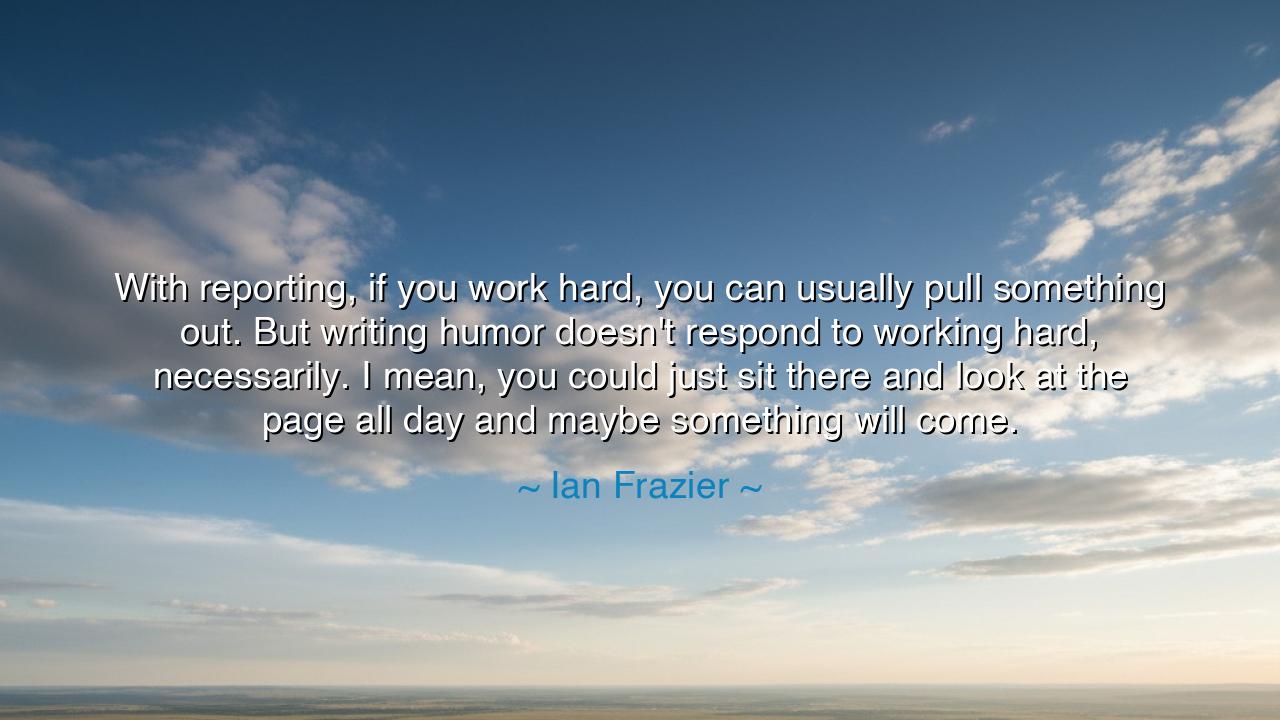
With reporting, if you work hard, you can usually pull something
With reporting, if you work hard, you can usually pull something out. But writing humor doesn't respond to working hard, necessarily. I mean, you could just sit there and look at the page all day and maybe something will come.






In the grand journey of human creativity and expression, there are few forces as mysterious and elusive as humor. The words of Ian Frazier offer us a window into this elusive realm: "With reporting, if you work hard, you can usually pull something out. But writing humor doesn't respond to working hard, necessarily. I mean, you could just sit there and look at the page all day and maybe something will come." In these words, we hear a profound truth—humor, unlike many other forms of creative work, does not always yield to effort. Humor, it seems, is not something that can be forced, but something that comes only when the spirit is willing to engage with the absurdities of the world in a playful, light-hearted way.
Consider, children, the wisdom of the Greek playwrights, who understood the delicate balance between effort and inspiration. Aristophanes, perhaps the greatest of the ancient comic writers, did not sit at his desk forcing humor into existence. His plays, filled with wit and sharp observations, arose from the spirit of the moment, from the absurdities of society and the contradictions within human nature. He understood that humor was not a product of sheer labor, but a gift that came when the world was ripe for observation. To write humor, as Frazier suggests, is to be attuned to the irony of life itself, and sometimes, despite all effort, it simply refuses to be coerced.
In the Roman world, humor was similarly revered for its truths, though not always easy to capture. Horace, the great poet, wove wit and humor into his satires, not as an escape from the harshness of life, but as a means to reveal the follies of the human condition. Yet even Horace knew that humor could not be summoned at will. Sometimes, his sharpest satires were born from his observations of the world, and other times, they came only after moments of deep reflection, when the absurdity of the world finally struck him with clarity. Like Frazier, Horace understood that writing humor is not simply a matter of hard work; it is a matter of waiting for the right moment when the world aligns with your vision, and the humor arises naturally.
The great Shakespeare, too, in his A Midsummer Night's Dream, captures this sense of humor that arises not from effort, but from the magical intersection of the fantastical and the real. In his work, the fairies who meddle with human lives create a delightful confusion—a humorous chaos that could not have been planned but came naturally from the unfolding of the story. This kind of humor, like that described by Frazier, cannot be forced, but rather emerges from the interplay of the characters, the plot, and the circumstances that shape them. Humor, then, is an organic force, one that flows through the writer, not one that can be dictated by mere will.
And so, my children, we are reminded of a truth: humor is not something to be commanded. It is a playful force, a fleeting gift that arrives when the conditions are right. Just as Frazier reflects on the nature of writing humor, so too must we recognize that sometimes, despite our best efforts, we must simply wait. Effort and hard work are necessary for many things, but in the realm of humor, there must also be an element of surrender—a willingness to let go and allow the world to reveal itself with all its absurdities and contradictions. Humor, like the best of life, comes when we least expect it, often unbidden, yet welcomed.
So, children of the earth, the lesson here is clear: humor cannot always be planned, and it certainly cannot always be forced. At times, the more we struggle with it, the more elusive it becomes. Instead, we must learn to observe the world with eyes wide open, to wait for the moments when the absurdities of life present themselves with such clarity that they demand a smile, a laugh, or a wry remark. In this, we honor the ancient tradition of humor not as a labor, but as a revelation, a gift that comes when the spirit is aligned with the world around it.
Embrace, then, the unpredictable nature of humor. Let it flow through you, not as something to be commanded, but as something to be witnessed and celebrated. Do not be frustrated by the moments when it eludes you, but instead wait patiently for it to arise, knowing that it is never far away. In this, you will not only find humor in your writing, but you will also learn to find the joy in life itself, and in those fleeting moments of laughter, you will glimpse the deepest truths of existence.






AAdministratorAdministrator
Welcome, honored guests. Please leave a comment, we will respond soon